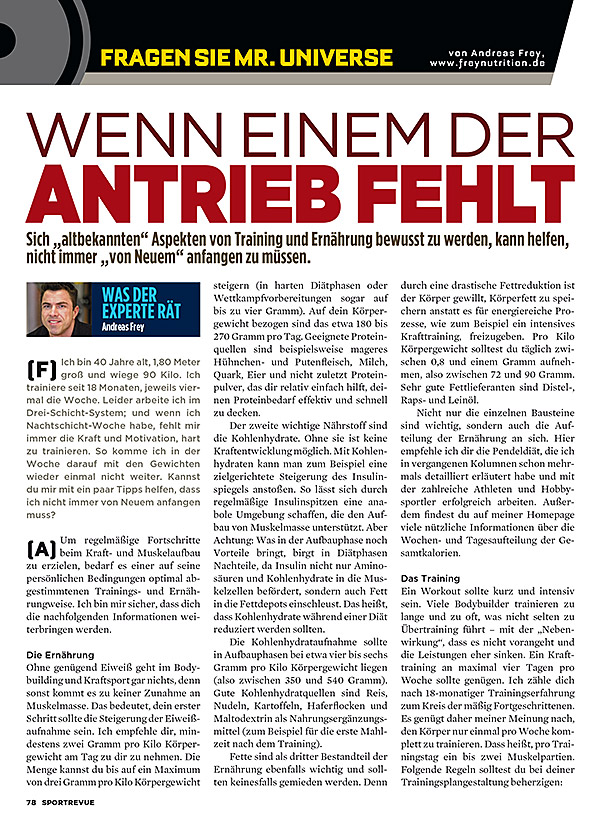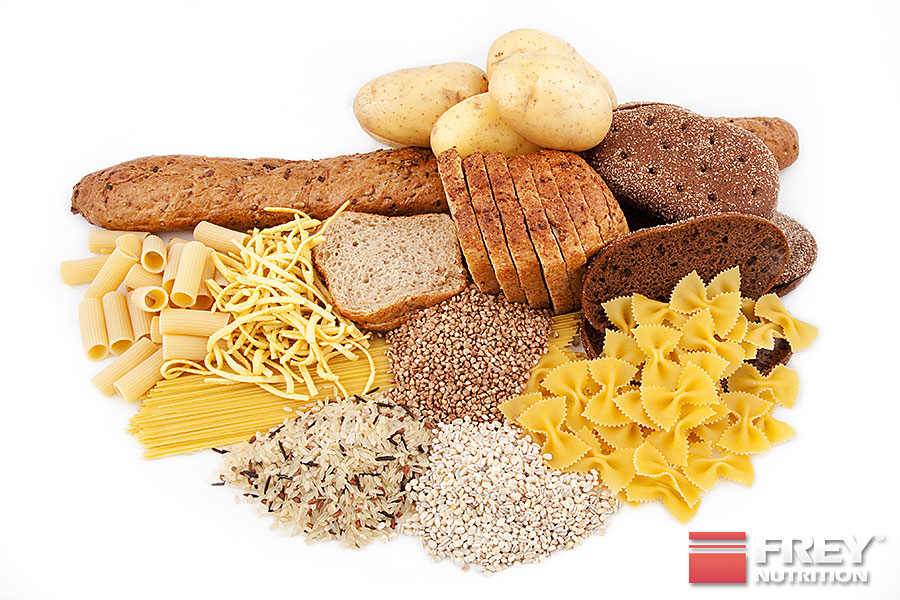BECOMING AWARE OF THE “OLD” ASPECTS OF TRAINING AND NUTRITION CAN HELP YOU NOT TO ALWAYS HAVE TO START “OVER”.
ANSWER

FOOD
Without enough protein, nothing will work in bodybuilding and strength training, otherwise there will be no increase in muscle mass. This means that your first step should be to increase your protein intake. I recommend that you at least two grams per kilo of body weight per day. You can increase the amount up to a maximum of three grams per kilo of body weight (in tough diet phases or competition preparations even up to four grams). In relation to your body weight, this is about 180 to 270 grams per day. Suitable protein sources include lean chicken and turkey meat, milk, cottage cheese, eggs and, last but not least, protein powder, which helps you to cover your protein needs effectively and quickly in a relatively simple way. The second important nutrient is carbohydrates. Without them, no strength development is possible. For example, carbohydrates can be used to trigger a targeted increase in insulin levels. Regular insulin spikes create an anabolic environment that supports the building of muscle mass. But be careful: what brings advantages in the building phase has disadvantages in dieting phases, as insulin not only transports amino acids and carbohydrates into the muscle cells, but also transports fat into the fat deposits. This means that carbohydrates should be reduced during a diet.Carbohydrate intake should be about four to six grams per kilogram of body weight (between 350 and 540 grams). Good sources of carbohydrates are rice, pasta, potatoes, oatmeal and maltodextrin as a dietary supplement (for example for the first meal after training).
Not only the individual components are important, but also the distribution of the diet itself. Here I recommend the PENDULUM DIET , which I have been following successfully for over 20 years. If you are generally interested in other diets and nutrition, I can recommend the article WHICH DIET IS THE BEST? recommend.
THE WORKOUT
A workout should be short and intense. Many bodybuilders train too long and too often, which often leads to overtraining - with the "side effect" that they don't make any progress and their performance tends to drop. Strength training on a maximum of four days a week should be enough. After 18 months of training experience, I count you among the moderately advanced. In my opinion, it is therefore sufficient to train the body completely just once a week. That means one or two muscle groups per training day. You should keep the following rules in mind when designing your training plan:- max. 60 minutes training time (warm-up not included)
- max. 10 sets for large and max. 6 sets for small muscles
- train the body completely only once a week
- intensive training until muscle failure
- technically clean and controlled movements
- even rest time between sets of 1.5 minutes
If taken 30 minutes before training, X-BURN will help you to be fit and fresh for your workout. It boosts your entire circulation and gives you new training energy. However, it is important to use X-BURN either as part of a diet for a maximum of 8 weeks or to only take it sporadically during build-up phases so that the body does not get used to the stimulating effect of caffeine - with the result that the effect is significantly weakened. Therefore, I advise you to only use X-BURN during build-up phases when you are experiencing acute symptoms of tiredness and a maximum of 2-3 times a week.
Otherwise, of course, getting enough sleep is an important factor in making progress. So remember to get enough sleep during the day (at least 7 hours), especially during the night shift weeks, so that muscle building processes can develop undisturbed. I wish you the best of luck!











